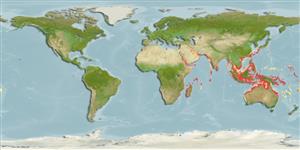Teleostei (teleosts) >
Beloniformes (Needle fishes) >
Hemiramphidae (Halfbeaks)
Etymology: Rhynchorhamphus: Greek, rhingchos = snout + Greek,rhamphos = bill (Ref. 45335).
Eponymy: Georges Dussumier is described in the etymology as a friend of Valenciennes. [...] (Ref. 128868), visit book page.
More on author: Valenciennes.
Environment: milieu / climate zone / depth range / distribution range
Ecology
Marine; freshwater; brackish; pelagic-neritic; depth range 0 - ? m. Tropical
Indo-West Pacific: the most widespread of the four species of Rhynchorhamphus, found from Persian Gulf through Arabian Sea and Bay of Bengal through the Western Central Pacific north to Taiwan and Hong Kong and east to New Guinea and northern Australia.
Length at first maturity / Size / Weight / Age
Maturity: Lm 15.8, range 15 - 16.5 cm
Max length : 31.0 cm male/unsexed; (Ref. 10943)
Found in inshore waters (Ref. 75154). Enters freshwaters (Ref 13446).
Life cycle and mating behavior
Maturity | Reproduction | Spawning | Eggs | Fecundity | Larvae
Collette, B.B. and J. Su, 1986. The halfbeaks (Pisces, Beloniformes, Hemiramphidae) of the Far East. Proc. Acad. Nat. Sci. Philadelphia 138(1):250-301. (Ref. 10943)
IUCN Red List Status (Ref. 130435: Version 2025-1)
Threat to humans
Harmless
Human uses
Fisheries: minor commercial
Tools
Special reports
Download XML
Internet sources
Estimates based on models
Preferred temperature (Ref.
123201): 24.9 - 29.2, mean 28.3 °C (based on 1440 cells).
Phylogenetic diversity index (Ref.
82804): PD
50 = 0.5625 [Uniqueness, from 0.5 = low to 2.0 = high].
Bayesian length-weight: a=0.00263 (0.00135 - 0.00511), b=2.95 (2.78 - 3.12), in cm total length, based on LWR estimates for this species & (Sub)family-body (Ref.
93245).
Trophic level (Ref.
69278): 3.1 ±0.2 se; based on size and trophs of closest relatives
Generation time: 0.8 ( na - na) years. Estimated as median ln(3)/K based on 1
growth studies.
Resilience (Ref.
120179): High, minimum population doubling time less than 15 months (K>1).
Fishing Vulnerability (Ref.
59153): Low vulnerability (16 of 100).
🛈
